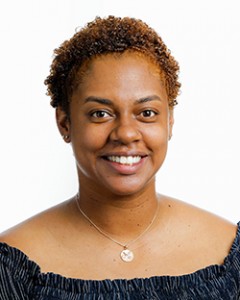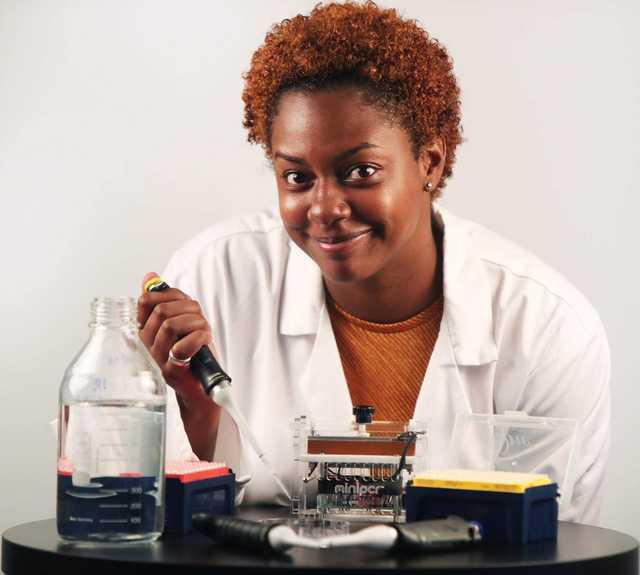BY ERIN SILVER
To say that Carika Weldon was busy recently would be an understatement. The biomedical science expert led Bermuda’s Covid testing programme from the start of the pandemic until the end of January this year.
She is now taking a well-deserved break.
“I worked for 18 months every day, straight,” Dr Weldon, 31, said in an interview after announcing she was stepping down from her role as science adviser and laboratory director of the Bermuda Government’s Molecular Diagnostic Lab. “Most days [I worked] 12-plus hours, 16 hours; the first six months, I worked for free.”
She was happily employed at the Wellcome Trust Centre for Human Genetics at the University of Oxford in the UK, when duty called.
As a government spokesperson explained, “Dr Weldon returned to Bermuda from the UK to devise a testing regime for Bermuda to increase testing capacity as part of the Covid-19 pandemic response. She has done so at a great sacrifice to her existing work in Oxford. She led the development of the Government’s Molecular Diagnostic Lab and has dramatically increased the island’s testing capacity, a critical element in successfully controlling the spread of Covid-19 on the island.”
Upon assuming the role, she ensured Bermuda achieved one of the top-ranking testing ratios compared to the rest of the world. Attaining that level of success was no easy feat.
A government spokesperson noted: “Dr Weldon has done an incredible job, bringing immense passion and commitment to the vital operation that has been Covid testing in Bermuda. She transitions with the sincere thanks of the Government and people of Bermuda for a job tremendously well done.”
Dr Weldon was humbled by the chance to serve her country – a country that enabled her to achieve the highest levels of academic success in her field. It was because she was so grateful for the opportunities provided by people here who helped fund her studies that she returned to Bermuda and worked for free for many months. “I really appreciate the experience and opportunities I have gained while working in this role. And my successor will be fortunate to be a member of the team,” she said in an interview.
Now that she’s stepped down, she’s going to take a break. “I’ve been going full speed ahead since I got here. I need a month to decompress from everything. I have no solid plan after that, but it’s fine. I don’t want to put too much pressure on myself.”
Dr Weldon has learnt to function in life without a map, and it’s worked out well for her. “I had a plan to go away to school, to study medicine at Oxford, to get married and have a family at a young age and open a practice in Bermuda. There was no way it wasn’t going to happen,” she said.
But when she applied to Oxford she didn’t get an interview. “My whole plan went up in flames. I didn’t know what I would do.”
She kept applying but didn’t get into any medical school at all. But she didn’t give up on pursuing a career in the medical field. She ended up studying medical biochemistry at the University of Leicester and went on to earn her PhD there. She had a meaningful, rewarding job as a researcher at Oxford when the pandemic hit and she decided her country needed her.
Those experiences have taught her a lot.
“If I could give advice, it’s that sometimes you have a plan and things work out differently,” Dr Weldon said. “I was planning to return home to conduct research, but I found myself in diagnostic testing instead.”
She wants Bermudians currently applying for university scholarships to know that it’s good to be adaptable, malleable and able to adjust. “Sometimes as young people we forget that,” she said.
When she was in high school, she applied for many different scholarships.
“I heard a lot of scholarship money is not used because people don’t apply. I recommend bermudascholarships.com as a great resource. People want to invest in the next generation, so apply to everything.”
She has some additional pieces of advice: “Be authentic. Have a pioneer mindset. Just go for it.”

Ultimately, Dr Weldon was offered two scholarships. The first, the Sir Henry Tucker undergraduate scholarship came from the Bank of Bermuda Foundation; the Sir Arthur Dudley Spurling Postgraduate Scholarship came from Butterfield Bank.
According to Dr Weldon, she wouldn’t have become a doctor without them. Ten years later, in 2020, she wanted to give back. She set up a charity called the Bermuda Principles Fou
ndation to create opportunities in the world of science and in the fourth year of the charity was able to launch a series of scholarships.
For the 2020-21 academic year, in partnership with the Cox family, the charity offered six scholarships named in honour of the late Eugene Cox, a former Minister of Finance and Deputy Premier. The awards ranged in value from $10,000 to $25,000 and were available for undergraduate and postgraduate students.
As founder and executive director of the Bermuda Principles Foundation, Dr Weldon said: “Through this initiative, we will be paying homage to the outstanding work and contributions made by Bermuda’s pioneers – the men and women of our science, technology, engineering and maths industry.”
Grateful to all those who helped her achieve her potential, she wants to help world-class Bermudians reach their goals so they can give back to their country too. She’ll get back to her foundation’s efforts soon. But first, Dr Weldon needs a little sleep.

